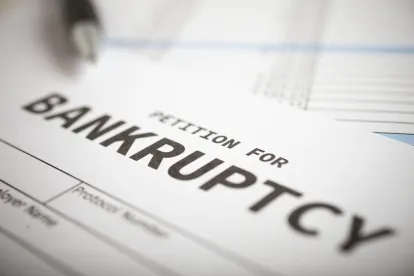You have a contract with Company Slow Pay/No Pay. You provide Company Slow Pay/No Pay with goods, and Company Slow Pay/No Pay pays you for those goods. Over the past year, you notice that Company Slow Pay/No Pay has become slower and slower in paying its invoices. You then receive notice that Company Slow Pay/No Pay has filed Chapter 7 bankruptcy. You are not surprised by this. You are surprised, however, when you receive a letter from a Chapter 7 Trustee stating that payments you received from Company Slow Pay/No Pay 90 days before the bankruptcy are “preferential payments” that you must return to the Chapter 7 Trustee. You’ve done nothing wrong, and in fact, you have done exactly what is contractually required between you and Company Slow Pay/No Pay. Company Slow Pay/No Pay has simply paid you under the terms of your contract. Sound familiar?
Bankruptcy Code Section 547(b) provides the Chapter 7 Trustee with the statutory authority for attempting to recover “preferential payments,” and states as follows:
[T]he trustee may… avoid any transfer of an interest of the debtor in property—
(1) to or for the benefit of a creditor;
(2) for or on account of an antecedent debt owed by the debtor before such transfer was made;
(3) made while the debtor was insolvent;
(4) made—
(A) on or within 90 days before the date of the filing of the petition; or
(B) between ninety days and one year before the date of the filing of the petition, if such creditor at the time of such transfer was an insider; and
(5) that enables such creditor to receive more than such creditor would receive if—
(A) the case were a case under chapter 7 of this title;
(B) the transfer had not been made; and
(C) such creditor received payment of such debt to the extent provided by the provisions of this title.
Does this mean that simply receiving the payment from Company Slow Pay/No Pay automatically requires you to return the payment to the Chapter 7 Trustee? No. Bankruptcy Code Section 547(c) provides defenses to potential preference liability. In particular, Bankruptcy Code Section 547(c)(2) provides as follows:
The trustee may not avoid under this section a transfer—
(2) to the extent that such transfer was in payment of a debt incurred by the debtor in the ordinary course of business or financial affairs of the debtor and the transferee, and
such transfer was—
(A) made in the ordinary course of business or financial affairs of the debtor and the transferee; or
(B) made according to ordinary business terms
This is commonly referred to as the “ordinary course” defense to preference liability, which protects payments made in the ordinary course of business between parties. However, proving the ordinary course defense, especially when payments were not made consistent with the terms required by invoices, can be difficult.
In the recent case of Miller v. Exist, Inc. (In re J&M Sales Inc.), No. 18-11801 (JTD), Adv. Proc. No. 20-50223 (JTD), 2022 WL 610780 (Bankr. D. Del. Mar. 1, 2022) the Chapter 7 Trustee sought to recover alleged preferential payments in the amount of $131,184. However, the defendant argued that a comparison between the past payment history (“Historical Period”) and the payment history within the preference period (“Preference Period”) between it and the debtors provided it with an ordinary course defense.
In particular, during the Historical Period, the debtors paid 12 invoices, which ranged from 100 to 430 days past the invoice date (with the invoice terms being either Net 60 or Net 180 days). However, the one invoice paid during the Preference Period (made by three separate transfers) was paid between 354 to 389 days past the invoice date. Thus, the Chapter 7 Trustee argued that using a “weighted average” analysis,[1] the weighted average days from invoice date to payment date increased from 276 days in the Historical Period to 371 days in the Preference Period, which would, according to the Chapter 7 Trustee, preclude an ordinary course defense.
The Bankruptcy Court disagreed. In particular, the Bankruptcy Court held that “late payments do not prevent [an ordinary course defense] when there is a pattern of late payments in both the historical and preference period” and that “consistency among the payments made is all that is required.” While the Chapter 7 Trustee solely argued that the “weighted average” analysis should be used to examine preference liability, the Bankruptcy Court held that it could use a number of analyses to determine whether payments satisfied the ordinary course defense, including the range, averages, and weighted percentages of the time between invoice date and payment date.
Here, the Bankruptcy Court applied a pure range analysis to determine that the number of days between invoice and payment during the Preference Period (between 354 to 389) was within the range of days between invoice and payment within the Historical Period (between 100 to 430). Thus, the Bankruptcy Court denied the Chapter 7 Trustee’s Motion for Summary Judgment[2].
Analyzing the ordinary course defense (or other defenses) to preference liability can be very technical and nuanced. Nelson Mullins attorneys are experienced in providing guidance for bankruptcy preference liability and are well equipped to advise on such issues.
[1] A weighted average is a statistical calculation that recognizes certain numbers are more important than others. For instance, a weighted average analysis for determining preference liability could be based on all invoices and after excluding outlier invoices (such as the top/bottom 10%).
[2] In his Complaint, the Trustee also included a cause of action to avoid the transfers under 11 U.S.C. § 548(a)(1)(B). The Trustee did not seek summary judgment on this issue, so presumably, this issue will be tried.




 />i
/>i

